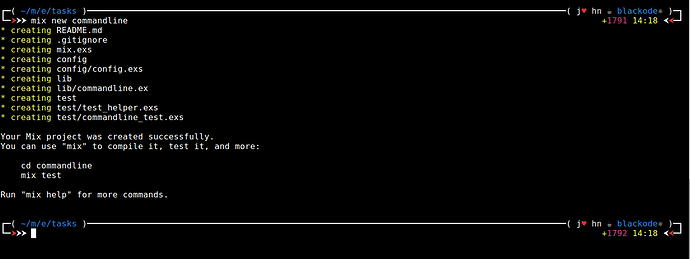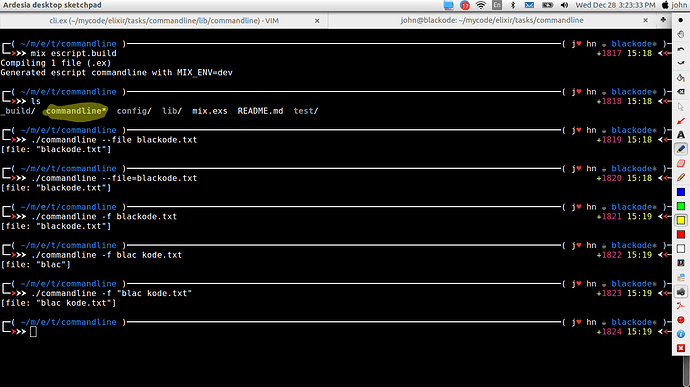Hi and Hello Every Elixirian.
After Learning the Elixir basics, I struck then. I have no idea of how to put my Elixir Knowledge in practice. I want to move next level, but I am helpless. I am not that expert in elixir to work on innovative projects by myself that too alone. But I still managed with **iex **, but that does not last long. I Google and found the article on this topic , that really innovative for Intermediate level Elixir Programmer. So, I had thought of sharing and I added a bit of scent and explanation with clear steps.
Creating the Mix project
mix new commandline
After creating the project dive into the folders of project.
You will find the lib folder which holds the application code base and mix.exs file which is holding the application or project meta data like dependencies, creator, links, etc…
Now run mix to compile your app the first time after changing the directory to app root path.
Escript
Elixir uses escript to build an executable file that runs as normal script . Its only dependency is Erlang installed on your machine. Elixir is not necessary, since escript embedds Elixir into the compiled app. At first we need to set the main_module in mix.exsby extending the existing function:
escript: [main_module: Commandline.CLI] add this line in the project definition
def project do
[app: :commandline,
version: "0.1.0",
elixir: "~> 1.3",
escript: [main_module: Commandline.CLI], # You have to add this extraline
deps: deps]
end
Creating main_module
This main_module will act as the entry point for the command line application. This main_module should contain one main/1 function. Lets create the Commandline.CLI module with main/1 function.
Go to the lib directory and create new directory commandline and new file cli.ex with main/defintion
Now open cli.ex file and edit as follows.
defmodule Commandline.CLI do #do not forget the namespace here
def main(args) do
{opts,_,_}= OptionParser.parse(args,switches: [file: :string],aliases: [f: :file])
IO.inspect opts #here I just inspect the options to stdout
end
end
args holds the command line arguments you will pass while executing the file.
OptionsParser.parse This parse the command line arguments and returns the tuple containing three values where we’re only interested in the first one. The second element holds remaining arguments and the last one invalid options. opts is a Keyword list containing all options converted to atoms with their associated value…
To explain this I will take one example.
Suppose you need to pass the filename as an option you can do that as follows .
Consider the commandline is executable file here
./commandline --file "blackode.txt" here --file is switch. You can pass as many you want. Here you can access that filename as opts[:file] which returns the string
./commandline -f "blackode.txt" here -f we have created aliases for file so we can access this as opts[:file] too as well.
Both approaches are very common for passing the data through the command line.
Building and Execution
To build the application you have to be in root path of the application and run the following command.
mix escript.build
This creates the executable file with name commandline
Run the Executable file with an argument
./commandline --file filename
or
./commandline --file=filename
If the file name contains the space wrap name inside the double quotes as “file name”
or
./commandline -f filename
The main function of the module takes all arguments, parses them and outputs a string to stdout
The yellow marked file is our executable file
Hope this helps ![]()
























